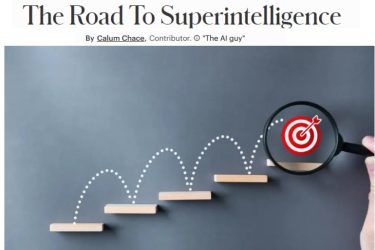
I lived in Dubai for three years in the early 1980s. The United Arab Emirates (UAE) was a very young country then, but its ambition was clear. The tallest building was the Dubai Trade Centre, at 30 stories. In fact, it was the tallest building in the whole of the Middle East at the time, and many people thought it was a folly: why build a skyscraper in the desert? It was a fair question: the road leading south from the Trade Centre towards Abu Dhabi was flanked on both sides by desert.
Now the Trade Centre is a smallish shrub in a forest of skyscrapers, most of them much taller, that has sprung up to accompany the traveller all the way to Jumeirah, 20 kilometers to the south.
Dubai is still run by the man who was effectively in charge when I worked there, and despite Emirate’s immense achievements, the ambition has not dimmed. The World Government Summit held there this week was a bold statement to the world: Dubai is looking to the future; it is visionary and optimistic.

In particular, Dubai is looking forward to the opportunities presented by our most powerful technology: artificial intelligence. It has appointed the world’s first Minister for AI, and in the Summit’s opening address, the Minister for Cabinet Affairs spoke knowledgeably about many of the opportunities and challenges that AI presents.
No country is perfect, and Dubai is not without its problems, both of reality and of image. This isn’t an article about those, but one thing that struck me was that the ratio of men to women was far more equal among the local delegates than among the foreign contingent.
Dubai’s optimism is sailing into headwinds. The wealthy Russians who used to spend freely in the emirate’s luxury malls have had their wings clipped by Western sanctions against Putin’s aggressive kleptocracy. The wealthy Saudis are similarly chastened by the revolution taking place the other side of the Liwa desert, and the rift with Qatar does not help. Local businesses are chafing under new restrictions and fees that all this is causing.
No-one knows whether these will prove temporary setbacks, or whether they will cause lasting damage. For now at least, But Dubai is looking confidently towards the future.
Landing back in the UK, the comparison is stark.
The metropolitan elite of Murdoch, Dacre, Farrage, Banks, Johnson, Rees-Mogg, Redwood, Hannan, Jenkin, and the rest have a vision of the UK as a buccaneering, free-trading nation, cutting deals with the rising powers of China and India as well as the existing superpower. Their claim that these are the fastest-growing countries in the world is obviously true, but it is far from obvious that Britain will be able to cut favourable deals with these thrusting new economies if it weakens itself by flouncing out of the powerful trading bloc in which it enjoyed such a privileged position, and churlishly insulting its former colleagues in the process. (Thanks for that, Mr Farrage.)
In any case, the metropolitan Brexiteer elite didn’t win the 2016 referendum with this vision. They knew that a population which feels wounded by globalism would not vote for the laissez-faire, low-tax, small-state Britain which would enrich the elite. Instead they appealed to our most backward-looking, resentful instincts, to our fear of the immigrant, our fear of the foreigner; they promised we could “take back control”, and head back in time to a halcyon bygone era.

Swallowed whole by Brexit, the UK government is largely ignoring the AI-fuelled future which is bearing down on us. When they do mention it, they talk blithely about the UK being a leader in the field, not least because we are home to DeepMind (ignoring its US ownership). Most of our politicians* seem genuinely unaware that AI is currently a two-horse race between the US and China, with everyone else jostling for a distant third place.
In particular, our political leaders are mostly either ignorant of the possibility of technological unemployment, or dismissive of it, eagerly lapping up the bromides of tech giant CEOs, who mumble soothingly that automation will not cause unemployment in the future because it didn’t in the past.
Britain sparked the industrial revolution, but its leadership appears largely clueless about the information revolution. Instead it is tiny Dubai, part of a country founded as recently as 1971, which faces forward to the information revolution, and seems eager to grasp the opportunities afforded by AI, and tackle its challenges.
* The All-Party Group on AI strives valiantly to cast light into the darkness, but attendance by parliamentarians is thin. [Disclosure: I’m one of its many advisers.]


